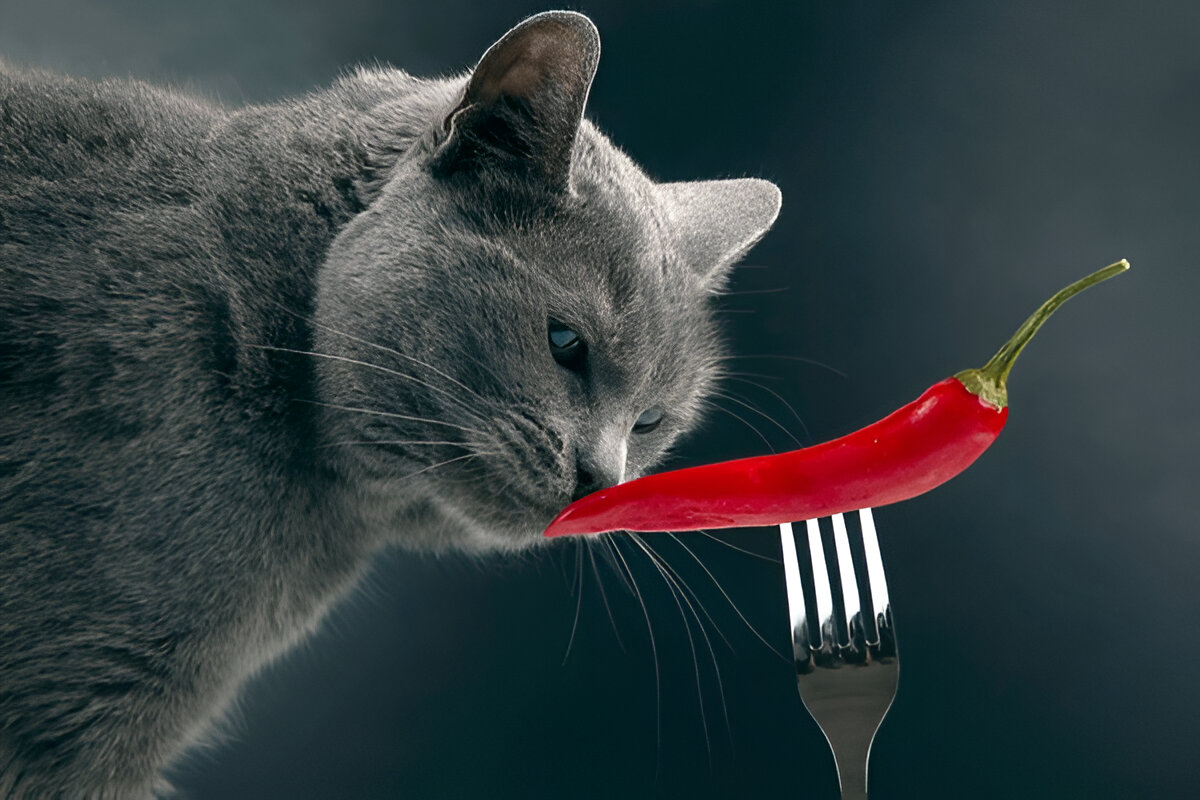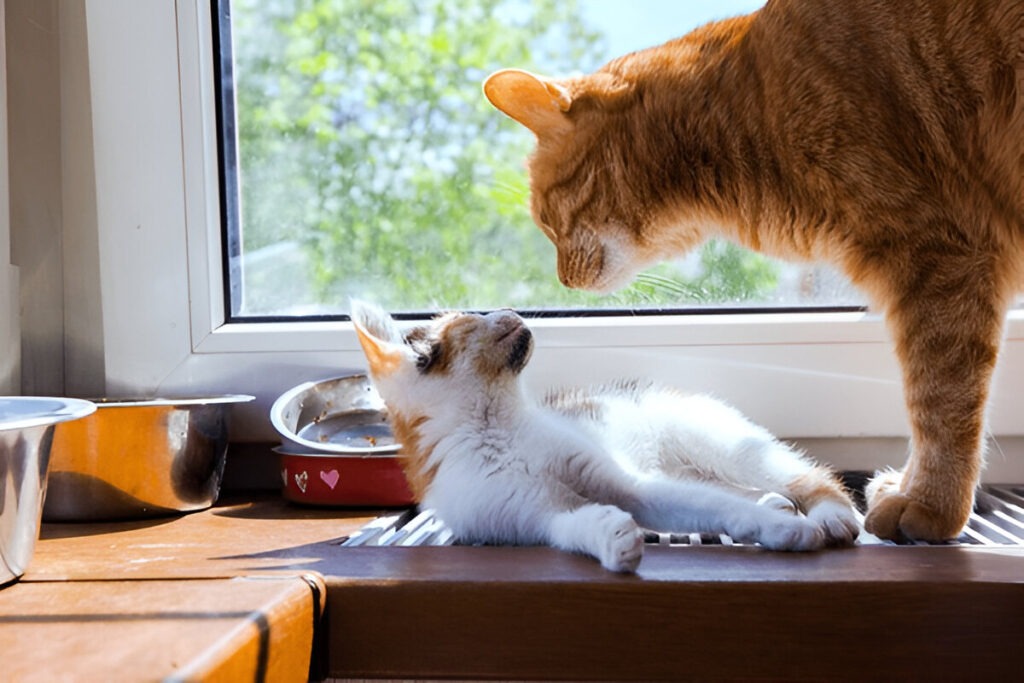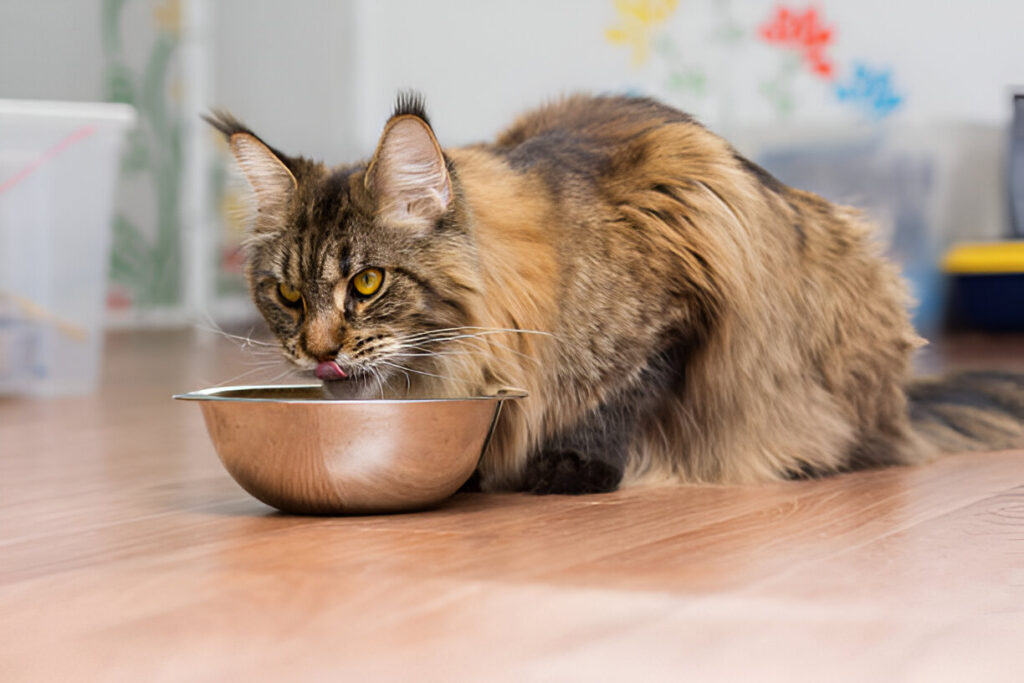Can Cats Taste Spicy?
Cats are curious creatures, and their quirks often spark our curiosity. One intriguing question many cat owners ponder is whether cats can taste spicy food. To answer this question, we need to delve into the fascinating world of feline taste perception and physiology.
The Feline Taste Palette
Like humans and many other animals, cats have taste buds that are designed to detect different flavors. However, their sense of taste is unique and somewhat limited compared to ours. While humans have about 9,000 taste buds, cats have significantly fewer-about 470. This difference greatly affects how cats experience flavors.
Cats can only detect a few flavors, such as sweetness and bitterness, while humans can detect a wide range of flavors. Cats also lack the ability to detect umami, which is the flavor associated with savory foods.
One of the primary factors regarding feline taste perception is their inability to detect sweetness. Cats do not have the taste receptors to pick up sweet flavors, a stark contrast to humans and many other mammals who love their sugary treats.
This evolutionary trait agrees with their carnivorous diet since their ancestors relied on meat for most of their nutrition, with very little need for carbohydrate detection. Cats are therefore not attracted to food with a high sugar content, such as candy or cookies. Cats, however, can detect umami flavors, like in meats, fish, and poultry.
What About Spicy Foods?

Spiciness, as it is perceived, is actually not a taste but a sensation. The chemical that makes foods, such as chili peppers spicy is called capsaicin. Capsaicin binds to the receptors in the mouth and throat known as TRPV1 (transient receptor potential vanilloid 1) receptors.
The result is that this binding sends an impulse to the brain interpreted as equivalent to heat or burning, which is what gives the sensation of burning. The body, because of that, releases endorphins that act to neutralize the pain perceived, hence the enjoyment of the burning sensation in food. Other than that, the intake of spicy food is characterized by physical reactions, such as perspiration, an increase in heart rate, and running nose.
These are neurologically controlled receptors; hence they detect heat and pain.
They also contain the TRPV1 receptors; hence, they are supposed to have this burning sensation resulting from hot or irritating food. However, this would be quite different from that of human beings. For cats, the “heat” of the food could be more one of discomfort or irritation rather than a well-defined gastronomic sensation, as they do not process flavors the same way humans do. Cats also detect spiciness by smell and tend to avoid some food based on odor.
Maybe this is due to some innate avoidance of novel stimuli. While in humans, the allure is the excitement of food on fire, even the burning sensation becomes pleasant, for cats, it is a very disagreeable experience in which they would avoid totally.
While mankind enjoys the flavor of spicy food because of the endorphins’ rush and food complexity, cats like to avoid discomfort as they don’t like flavors like human. This is the dichotomy that makes food preference and feeding behavior unique in a species-specific manner.
The Science Behind Capsaicin Sensation
To fully understand how cats might react to spicy food, it’s helpful to explore the mechanics of capsaicin and its effects. When capsaicin binds to TRPV1 receptors, it triggers a response that the brain interprets as heat. This is why spicy foods can make you feel as if your mouth is on fire. In cats, this sensation could be even more uncomfortable because their smaller mouths and sensitive mucous membranes may amplify the effect.
Interestingly, the TRPV1 receptors play a role beyond just sensing spicy food. They are part of a broader sensory system that detects physical heat. This means that a cat’s reaction to capsaicin might not just be about the food itself but also a broader sensory response that could lead to discomfort or avoidance behavior.
Why Cats Should Avoid Spicy Foods
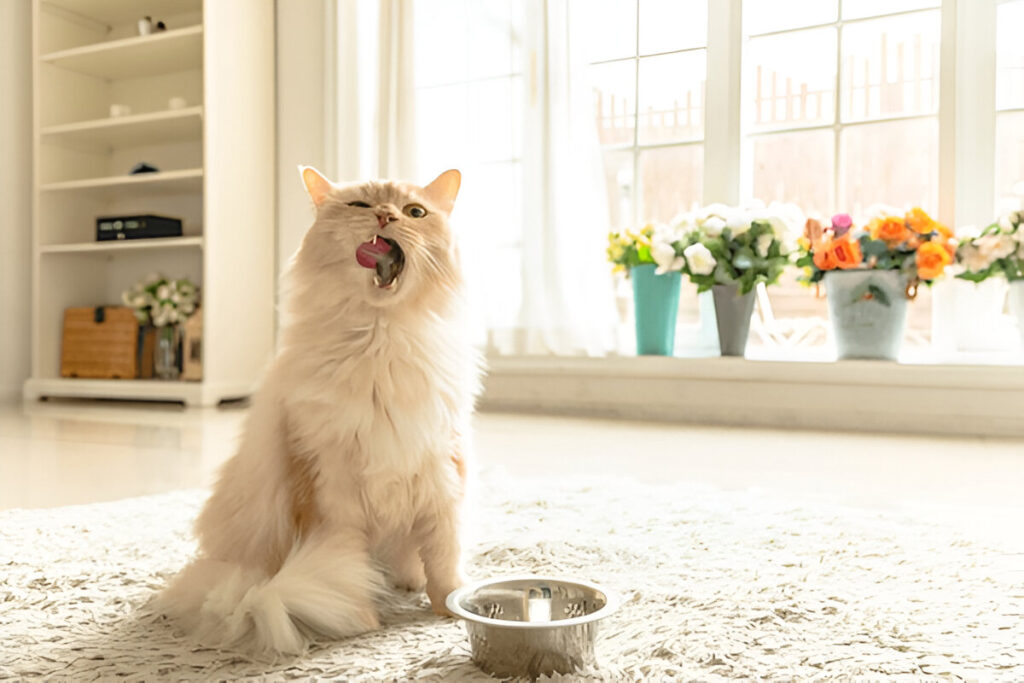
Cats should not eat spicy foods because their bodies are not designed to process the various ingredients and sensations involved in such dishes. The spicy foods contain capsaicin, the chemical that gives them their heat, which can be very distressing for cats. Let’s take a closer look at why spicy foods are bad news for our feline friends:
. Digestive Upset
- Cats have a very sensitive digestive system. Pungent foods can irritate the lining of the stomach, resulting in symptoms such as vomiting, diarrhea, and abdominal pain. Even a little will make them uncomfortable.
. Irritation of Mouth and Throat
- Capsaicin in spicy foods attaches to receptors in the mouth and throat, which causes a burning sensation. While humans may enjoy this as a culinary experience, cats perceive it as discomfort or pain, which could potentially deter them from eating or drinking afterward.
. Toxic Ingredients in Spicy Dishes
- Most spicy foods have other ingredients like onions, garlic, and excess salt-all toxic to your cat. Onions and garlic may destroy a cat’s red blood cells since they are destructive in nature, thus causing conditions such as anemia among other complications.
. Nutritional Imbalance
- Being obligate carnivores, their diet should mainly consist of animal proteins. Spicy foods carry absolutely no nutritional value for them and upset the natural balance of their diet. Feeding them such foods may even cause long-term health issues.
. Behavioral and Psychological Impact
- Introducing spicy foods to a cat\u2019s diet can cause them to associate food with discomfort. This can lead to food aversion or stress during meal times, complicating their eating habits and straining the bond between pet and owner.
What to Do Instead
If your cat shows curiosity about your food, offer them safe, cat-friendly treats instead. Cooked chicken, fish, or specially formulated feline snacks are excellent choices that align with their nutritional needs. Always consult your veterinarian before introducing new foods to your cat’s diet.
By understanding and respecting your cat\u2019s unique dietary requirements, you can ensure they remain healthy, happy, and free from the unnecessary risks posed by spicy foods.
The Role of Smell in Food Choices
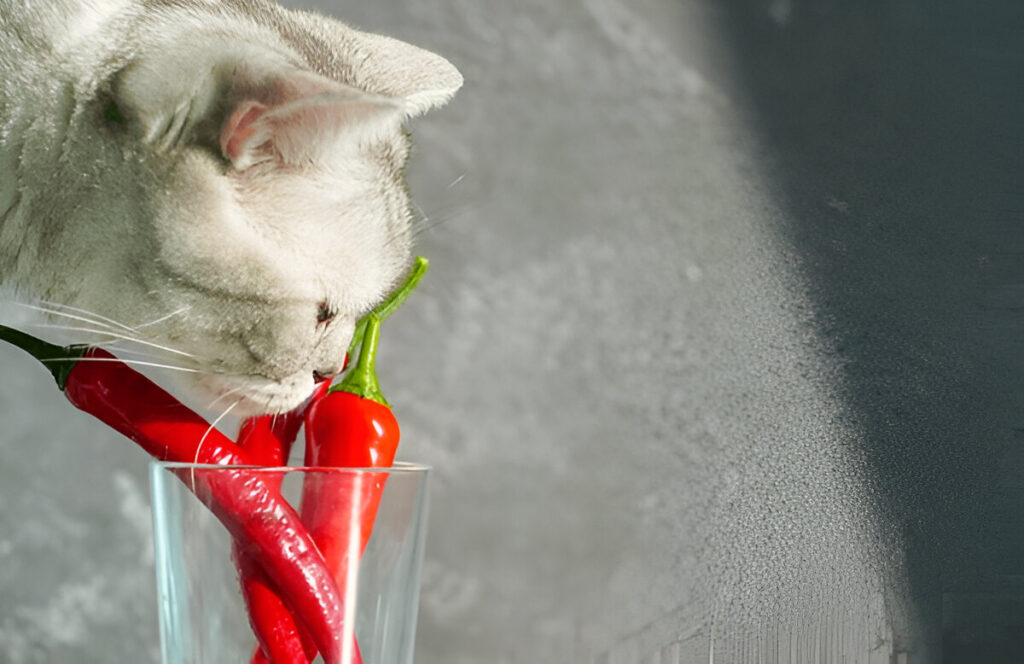
A cat’s sense of smell plays a significant role in their interest in food. Cats have an acute sense of smell, with approximately 200 million odor-sensitive cells in their noses, compared to about 5 million in humans. This means that the aroma of food is a primary factor in whether a cat decides to investigate or consume something.
Spicy foods often have strong, pungent aromas that might attract a cat’s curiosity. However, this doesn’t necessarily mean they’ll enjoy the taste. In many cases, a cat might sniff spicy food and walk away, deterred by the intensity of the smell. If they do take a bite, their reaction is likely to be one of surprise or discomfort rather than enjoyment.
Common Misconceptions About Cats and Spicy Food
Some pet owners mistakenly believe that cats can enjoy spicy food because they’ve seen their feline friends nibble on a spicy dish. However, it’s important to distinguish between curiosity and preference. Cats are naturally inquisitive and may try a small bite of something new, but this doesn’t mean they find it palatable or enjoyable.
In some cases, cats might associate spicy food with their owners’ behavior. If a cat sees their human eating spicy food enthusiastically, they might be tempted to try it out of social curiosity or a desire to mimic their owner. However, this behavior doesn’t indicate a genuine liking for spicy flavors.
How to Handle a Cat’s Curiosity
Cats are naturally curious and may be drawn to the strong aroma of spicy foods. To keep your feline friend safe, follow these tips:
- Keep Spicy Foods Out of Reach: Store leftovers securely and avoid leaving spicy dishes unattended.
- Provide Cat-Safe Alternatives: If your cat shows interest in your food, offer them a safe and healthy treat designed for felines.
- Monitor Their Behavior: If your cat accidentally ingests spicy food, watch for signs of distress and consult your veterinarian if necessary.
Safe and Enjoyable Treats for Cats
If you want to share a special moment with your cat, consider offering them treats that are specifically designed for their dietary needs. Many pet stores carry a variety of cat-friendly snacks, including freeze-dried meat, fish flakes, or specially formulated catnip treats. These options provide a safe and enjoyable way to indulge your cat without risking their health.
Additionally, you can prepare homemade treats using simple, cat-safe ingredients. For example, small pieces of cooked chicken or turkey (without seasoning) can be a delightful and healthy treat for your feline friend.
Understanding Feline Nutrition
To truly appreciate why spicy foods are unsuitable for cats, it’s important to understand their nutritional requirements. Cats are obligate carnivores, meaning they rely primarily on animal proteins to meet their dietary needs. Their bodies are designed to extract nutrients like taurine, arachidonic acid, and vitamin A from animal tissues.
Unlike omnivores or herbivores, cats have limited metabolic pathways for processing plant-based foods. This means that many of the ingredients found in spicy dishes—such as peppers, onions, and garlic—are not only unnecessary for their diet but potentially harmful.
The Psychological Impact of Feeding Spicy Foods
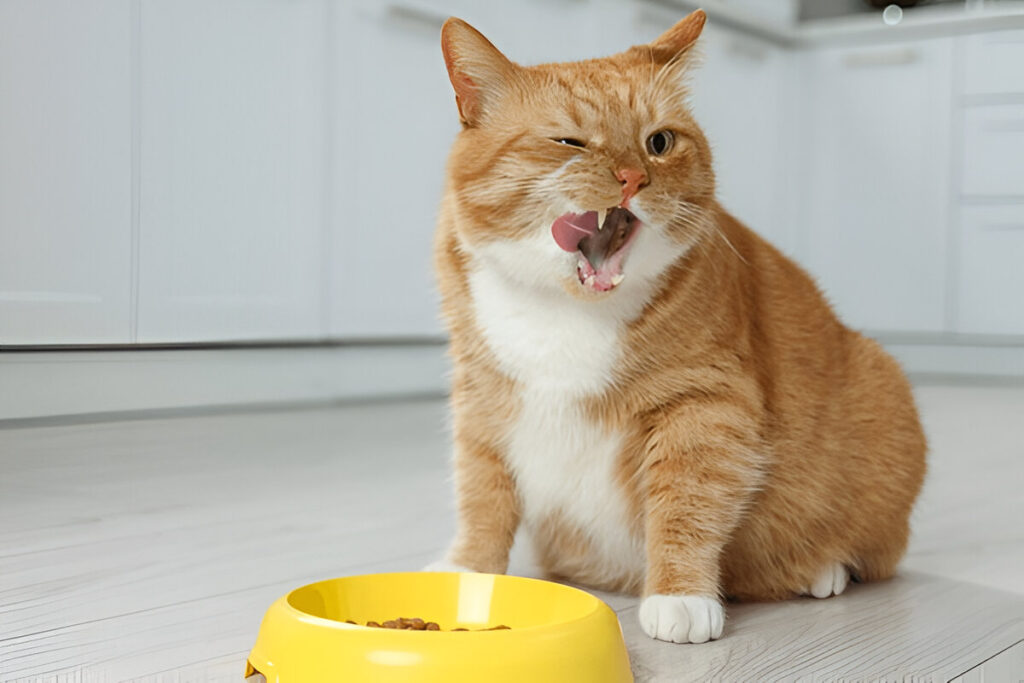
Feeding spicy foods to cats can have psychological repercussions as well. If a cat associates a particular food with discomfort or pain, they may become wary of trying new foods in the future. This could lead to picky eating habits or even food aversion, which can be challenging for pet owners to manage.
Moreover, forcing or encouraging a cat to eat something that causes them discomfort can erode the trust between pet and owner. Building a positive and supportive relationship with your cat involves respecting their preferences and ensuring their well-being.
Anecdotal Evidence and Misinterpretations
The internet is filled with anecdotes of cats reacting humorously to spicy foods, often shared as entertaining videos. While these clips might elicit laughs, they can perpetuate harmful behaviors by normalizing the idea of feeding inappropriate foods to pets. It’s essential to approach such content critically and prioritize the health and safety of your own cat.
What to Do if Your Cat Eats Spicy Food
What to Do if Your Cat Eats Spicy Food
If your cat accidentally eats spicy food, it is important that you take swift action so that the safety and comfort of your feline friend are guaranteed. Here are steps you should take:
. Stay Calm and Assess the Situation
Ascertain the amount and type of spicy food your cat has ingested. Small amounts of mild spice may not be cause for serious concern, whereas larger amounts or foods that include potentially hazardous ingredients, such as onions, garlic, or chili peppers, are cause for more serious concern.
. Look for Symptoms
Immediately observe your cat for any of the following symptoms of being in distress, such as drooling or pawing at their mouth, vomiting, diarrhea, increased thirst, or complete refusal to eat. Whining and attempting to lie down to indicate abdominal discomfort, if he is showing any of the above symptoms mentioned herein; that may indicate irritation or stomach upset from the spicy food.
. Immediate Relief
Offer your cat fresh water to help rinse their mouth and soothe the burning sensation. Do not give them milk or dairy products unless you are sure they are not lactose intolerant, as dairy sometimes worsens gastrointestinal problems.
. Do Not Induce Vomiting
Never induce vomiting unless instructed by your veterinarian. Forcing vomit can lead to further damage, especially if the spicy food has toxic components.
. Consult Your Veterinarian
In severe symptoms, large amount, or consumption of a dish containing ingredients potentially toxic to cats -such as onions or garlic -, immediately consult your veterinarian. They may advise if further medical treatment may be required.
. Follow up for Long-Term Complications
Even after the initial symptoms subside, keep an eye on your cat\u2019s behavior and health for the next 24-48 hours. Persistent symptoms may require a follow-up visit to the vet.
Prevention Tips
How to prevent this in the future:
- Keep spicy foods and leftovers out of reach.
- Never leave a plate unattended during meals.
- Give cat-friendly treats for satisfying that curiosity about your food.
Being quick and responsible will help you reduce risks associated with the incident eating of spicy foods and let your feline friend be safe and healthy.
While cats can sense the heat from spicy foods due to their TRPV1 receptors, they don’t “taste” spiciness in the way humans do. Their unique physiology and dietary needs make spicy foods an unnecessary and potentially harmful indulgence. As responsible pet owners, it’s our duty to ensure that our cats’ diets align with their health and well-being.
By understanding the science behind feline taste perception and respecting their natural dietary preferences, we can provide our cats with the care and nutrition they need to thrive.
So, while it may be tempting to share your favorite spicy snack with your furry companion, it’s best to stick to treats that are specifically made for them. Your cat will thank you with purrs and snuggles—no spicy side effects included!
can cats eat spicy food , feel , eat , taste Image by Annette Meyer
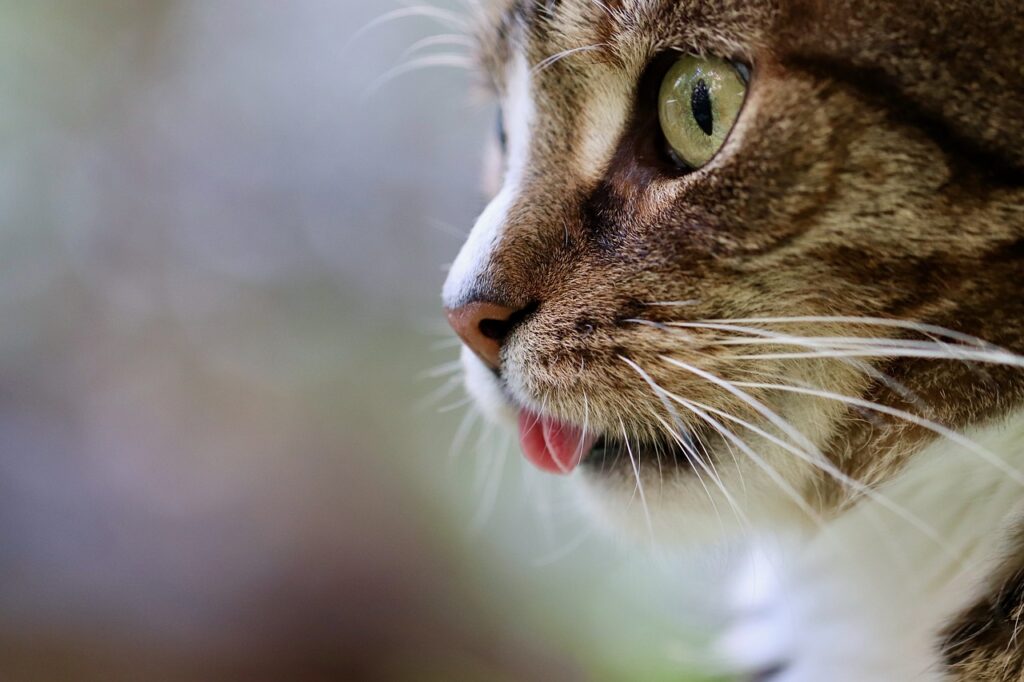
Yuns Legdm is a passionate advocate for pet care and the founder of this website, dedicated to providing valuable information for fellow pet lovers and veterinary professionals worldwide. With a deep love for animals, Yuns created this platform to connect passionate pet owners with expert insights from veterinarians around the globe.
This website grows with you—the passionate pet owners and veterinary experts—creating a trusted space where knowledge, experience, and love for animals come together. Whether you’re seeking advice on pet health, nutrition, or general well-being, this platform is here to support you on your journey of responsible and loving pet care.

